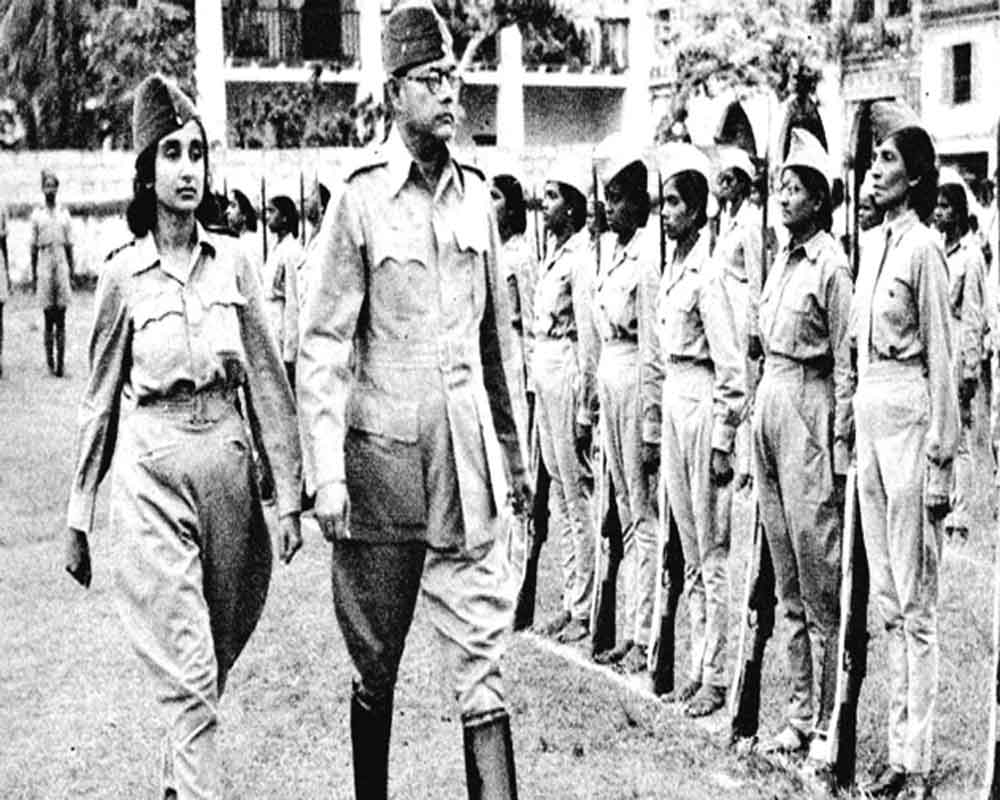The INA had won its war on the day Netaji persuaded the Indian prisoners of war in Axis hands to quit their servitude to their British masters and come over to the Azad Hind Fauj
I have read commentaries on, football and hockey matches, where the focus has mostly been on whether goals were scored, by whom and how. Commentaries on these games would seldom mention who dribbled the ball into the ‘D’, to be converted into a goal by his centre-forward colleague.
If you ask me who scored the goal that won India its independence in August 1947, it was Netaji Subhas Chandra Bose. Strangely, post-independence commentaries do not mention this historic goal, not even those who grew up with me in Kolkata. Most virtually worshipped Netaji for his patriotism and sacrifices, but would not give him substantial credit for scoring the winning goal of Indian independence. Beyond a few who were close to Subhas, others did not walk out of Congress because of Subhas’s expulsion from the party in April 1939. Nor was there the scale of protest one would have expected given the stature of Subhas.
What was his fault? Did he harm the Congress? No. His crime, if any, was to get elected as Congress president for a second consecutive year. What he had done, albeit not willingly, was to not have taken Gandhi’s consent before contesting for the Congress presidentship the second time. Where was the inner-party democracy Jawaharlal Nehru later boasted of? But even he lay low. Subhas Bose concluded that he had no political future left in the Congress. Had he wanted any further progress, he would have to emigrate. Subhas picked Germany as the only likely country he could shift to.
Bose made a daring escape from British captivity on January 7, 1941, travelling through Afghanistan and the Soviet Union to finally reach Germany. His stay, meeting Adolf Hitler and obtaining German support and assistance are the stuff of legend. He then undertook a perilous three-month journey in a German submarine to transfer to a Japanese submarine surfacing off the coast of Madagascar in the Indian Ocean. A nucleus of the Indian National Army (INA) already formed by Ras Bihari Bose, awaited his command, and Subhas soon raised the number of soldiers, including a women’s battalion, to a total of 50,000 soldiers. The remarkable thing about these INA numbers was the large number of prisoners of war who had formally sworn loyalty to the king and country (Britain). This had never happened before in British history. Such mutinous behaviour was unthinkable and shocked the British leaders of the day.
Not that the British had not experienced a mutiny. They had in fact, overcome a serious one in 1857-58—the Sepoy Mutiny. But the mutineers then had not sworn by the English king and country. They were mere employees of a private commercial enterprise, the East India Company. The INA came up to Imphal, with one famous battle between the British Indian army and Subhas Indians taking place on the tennis court of the collector’s bungalow. This was the INA’s last clash before it retreated towards Singapore in 1944.
Netaji and his immediate colleagues like Kayani and Shah Nawaz Khan must have been dejected at the defeat and retreat. They might not have realized that even in their defeat lay the seeds of triumph. They could not have imagined that the INA had won its war on the day Netaji had persuaded the Indian prisoners of war in Axis hands, to quit their servitude to their British masters and come over to the Azad Hind Fauj (the INA). Thereafter, His Majesty’s government could never again trust an Indian soldier who had been sworn in by the king and country. There were several lakh officers, clerks and fighting men of them.
The British themselves, in the service of the jewel in their crown, would have numbered no more than 50,000 men and women in the entire subcontinent. Could such a small number possibly have controlled and helped rule a population of 40 crore people? In 1956, Clement Atlee (Prime Minister of Britain during 1945-50), visited Calcutta and stayed with the acting governor of West Bengal, Justice P.B. Chakraborty.
At dinner, the Governor enquired of Atlee why the British quit India in such a hurry when they could have hung on for another ten years. Atlee did not agree with this assessment. Instead, he said that Netaji Subhas forming the INA and their confronting the British had lit a spark. This could have easily happened with the civilian employees as well. How then could we have held on to the levers of governance? No, Mr. Governor, our time was up. It was best to quit gracefully before being kicked out.
The former British Prime Minister’s unequivocal opinion reveals that it was Netaji Subhas who won independence for India. He scored the winning goal, which Prime Minister Narendra Modi knows only too well and has not only acknowledged but has acted upon it as well. It is befitting that the grand consecration of the Shri Ram Temple at Ayodhya on the coming January 22 falls just a day ahead of Netaji’s birthday on January 23rd. Aptly, the pranpratishtha (consecration ceremony) is to be performed by Narendra Modi, who has fulfilled Netaji’s clarion call of “Chalo Dilli†by finally giving India’s true independence hero his rightful place in history, both figuratively and literally.
(The writer is a well-known columnist, an author and a former member of the Rajya Sabha. The views expressed are personal)


























